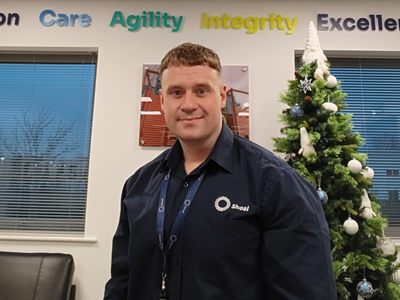“Ensuring the health, safety and welfare of people requires a critical eye for detail in which as a serving soldier, the skill comes naturally because of the way you are disciplined from the start of your career.”
Case Study: Daniel Hollingsworth
We recently spoke to Daniel Hollingsworth. Daniel joined the British Army when he was 20 years old. Now, as an HSET Coordinator for Shoal, Daniel tells us about his transition from the forces to a career in health and safety.

Tell me a bit about why you decided to join the Army.
My life wasn’t advancing positively, I was surrounding myself with bad influences and making poor decisions. Personally, I knew I needed to join the military to unlock pathways to a brighter future.
In 2012, at 20 years old, I joined the Army. During my training, my character changed dramatically. I was rebuilt to army standards under the supervision of some fantastic instructors. The Army’s core values and standards were instilled in me: courage, discipline, respect for others, integrity, loyalty, and selfless commitment.
How would you say the skills from your career in the Army are similar to those needed for working in health and safety – are there a lot of transferable skills?
Ensuring the health, safety and welfare of people requires a critical eye for detail in which as a serving soldier, the skill comes naturally because of the way you are disciplined from the start of your career.
Army training trains you to notice the fine details in things, from the turnout of your appearance to the accurate reporting and communications needed on the battlefield.
In the Army, it’s all about looking after the people you work alongside; we call it the buddy-buddy system; you are always checking and looking after each other when on exercises or operations. As a leader, it was my responsibility to look after the troops below me; ultimately, my job was to keep them and myself alive in hostile combat situations. Health and safety legislation and regulations highlight not only is an employer responsible for the health and safety of their workers, but employees have responsibilities to each other too.
Being trained in risk assessments and managing risk in different environments translates into the health and safety industry. I have been able to easily identify potential workplace hazards and implement control measures to mitigate the risks.
Having strong communication skills is key for the military to be successful. In the health and safety industry, having such a skill set is also a factor for success. The ability to present information clearly, give and follow instructions and communicate with diverse groups confidently are all good examples for promoting a positive culture of safety in any workplace.
In the military, you are subject to continuous training. Personally, I’ve got a lot of experience as a training instructor. The skill of being able to teach and deliver training catering to different learning styles can be transferred to a civilian workplace, as education and training are big factors in maintaining health and safety.
Can you tell me about your current role?
Since leaving the British Army, I have been fortunate to dive straight into civilian employment and I am now proudly employed by Shoal Safety in Numbers as Shoal's current Health Safety Environment Training Coordinator.
I was given the opportunity based on my extensive training experience as a lead instructor within the armed forces and fully transferable skills and because I obtained my NEBOSH National General Certificate in Occupational Health and Safety during my transition.
Why did you decide to pursue a career in health and safety?
I decided to pursue a career in health and safety as I'm passionate about helping others. I joined the military to do exactly that, to protect our homeland and our people. As well as the physical aspect of health and safety, I have a passion for the morale and behavioural component, I am proud to be a part of providing a positive cultural change and educating individuals. For me there is nothing more rewarding than helping others.
What piece of advice would you give someone looking to transition into a career in health and safety?
My advice for anyone making the transition is to simply believe in yourself and your abilities. Despite being surrounded by such positive people, I felt like I was experiencing imposter syndrome. I think imposter syndrome is a natural feeling for all service leavers transitioning. You are essentially conducting a complete lifestyle change, and you just need to embrace that feeling and believe in yourself because you do have all the skills to succeed.
Do not under sell yourself and keep your morals and values that have been installed in you throughout your service as people can genuinely see it.
Use every day as a learning day and just try your best in everything you do. If you put in the same work ethic you did in the military, I'd like to think any employer would be grateful.
Study hard, list your goals, and formulate a plan for measuring yourself toward achieving them.
